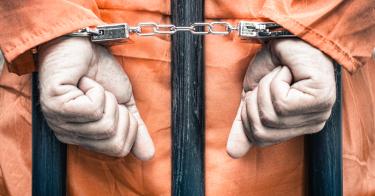Dzhokhar Tsarnaev, the Boston bomber whose cold-blooded attacks killed three including a child and maimed scores more, ought to be able to vote. So, too, should every other incarcerated terrorist, murderer, rapist, human trafficker and Fentanyl dealer. That, unbelievably, is the position of Sen. Bernie Sanders.
Fortunately, the vast majority of Americans feel differently. One poll found that 75% of Americans disagree with his basic argument that voting rights should never be taken away from felons under any circumstances.
But Sanders hasn't relented. He even published an opinion piece in USA Today holding up prison voting as an antidote to a criminal justice system he characterized as systemically racist, which enables "mass incarceration" as a "tool of voter suppression."
That's a bizarre notion, even coming from a man who once claimed that bread lines are a good thing.
There is an ongoing, constructive and bipartisan national effort to reform many of our criminal justice policies. That effort includes reining in the tremendous volume of criminal laws and regulations, and evaluating whether certain prison sentences are too harsh.
It also involves better positioning felons to reintegrate into society. We need to give them transferrable skills and remove unnecessary collateral consequences that do little except thwart their success.
But that doesn't mean we should forget the fact that people in prison are there because they chose to commit a crime. And often, as the Tsarnaev case shows, those crimes are heinous.
Felons lose many freedoms that law-abiding citizens enjoy. Personal liberty, the freedom of speech and expression, the right to privacy, and countless other constitutional guarantees either do not exist in prison, or are sharply curtailed.
And in 48 states, felons also lose their right to vote in prison, and typically, for some period of time afterward.
Sanders attributes this to the "legacy of slavery" and claims that felon disenfranchisement has its roots in the efforts of southern states to undo the progress African-Americans achieved with the 13th, 14th, and 15th Amendments. In actuality, criminal disenfranchisement dates back to ancient Greece, and was in force in a majority of states before the Civil War, when African Americans had no voting rights to strip away.
In fact, the 14th Amendment itself allows states to remove voting rights as punishment for criminal misconduct an odd thing for Congress to include in an amendment intended to protect the civil rights of former slaves, if Sanders's assertions are to believed.
Yes, there were detestable efforts in the past to block voting rights based on race, but that isn't the case today and it certainly isn't the reason we disenfranchise felons. Nearly every state recognizes the wisdom of preventing prisoners from voting. There is simply no reason that those who have shown they cannot follow the law ought to have a say in crafting it or electing those who will enforce it.
Disenfranchisement should not be permanent for all felons, but it also shouldn't be automatically and unequivocally restored. Recidivism rates in the U.S. are alarmingly high; one Bureau of Justice Statistics survey of 30 states found that 76.6% of inmates released in 2005 were rearrested, and 55.1% returned to prison, within five years. We must tackle chronically high recidivism, but prison voting will not do that.
Inmates need better prison programing that encourages positive behaviors and equips inmates with job and life skills. Conservative states have proven that these reforms work, and have reduced prison populations and recidivism; last year, Congress enacted similar programs, which must now be implemented, for federal prisons with the FIRST STEP Act.
Lawmakers should address the thicket of occupational restrictions, assessing which are truly necessary, and which merely erect barriers to success.
But for Sanders, it's all about voting. He can veil his argument in high-minded rhetoric, but it's hard to escape the cynicism of it. If he truly wanted to protect all the rights "enshrined in our Bill of Rights," he'd be calling for felons to automatically get their gun rights back, too.
It's doubtful he ever will, and with good reason.
Felons show through their actions that they do not deserve society's implicit trust. They do deserve a second chance, but the burden is theirs to demonstrate that they have become law-abiding and upstanding citizens in other words, the very people we want to be voting.
This piece originally appeared in the Chicago Tribune



